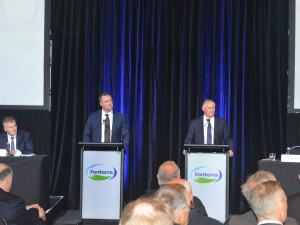Battle for milk
OPINION: Fonterra may be on the verge of selling its consumer business in New Zealand, but the co-operative is not keen on giving any ground to its competitors in the country.
 Peter Mcbride told the co-operative’s annual general meeting in Methven today that there’s a misconception that Fonterra is active in the market to boost its share price.
Peter Mcbride told the co-operative’s annual general meeting in Methven today that there’s a misconception that Fonterra is active in the market to boost its share price.
Fonterra chair Peter McBride says the co-operative isn’t buying shares to prop up its share price.
He told the co-operative’s annual general meeting in Methven today that there’s a misconception that Fonterra is active in the market to boost its share price.
“Following the transition to the flexible shareholding structure, we implemented market maker arrangements to support liquidity in the Fonterra Shareholders’ Market,” says McBride.
“We also have the ability to buy back shares as part of our ongoing capital management programme, where we see it as value accretive to the co-op.”
Fonterra's share price has been having a rollercoaster ride in recent years. Five years ago, the co-op's share price was around $5.40/share. Today, it’s valued at $2.16/share.
Fonterra farmers need to buy shares before they can supply milk. Farmers who bought their shares at around $5-$6 each five years ago have seen their value halved. Earlier this year, the co-op also announced a $50 million share buyback scheme.
McBride acknowledged that the share price has come down.
He says this was anticipated and well-signalled before shareholders voted to support the changes to its capital structure.
“There has also been a share price impact because of the recent capital return.
“Over time we expect that the price will reflect the co-op’s financial performance, and the value farmers see in that. Ultimately, farmers will determine the value of the shares.”
McBride says flexible shareholding is the right capital structure for the co-op.
It has been in place since March and is “working broadly as expected”, he adds.
“By making it easier for farmers to join, or stay with, the co-op, it will help us to maintain a sustainable milk supply here in New Zealand, where milk volumes are declining.”
The World Wide Sires National All Day Breeds Best Youth Camp Best All Rounder plaudit has become family affair, with 2026 Paramount Cup winner Holly Williams following in her sister Zara's footsteps.
DairyNZ is giving New Zealand farmers a unique opportunity to gain hands-on governance and leadership experience within the dairy sector.
Herd improvement company LIC has posted a 5.2% lift in half-year revenue, thanks to increasing demand for genetics.
According to the latest Fresh Produce Trend Report from United Fresh, 2026 will be a year where fruit and vegetables are shaped by cost pressures, rapid digital adoption, and a renewed focus on wellbeing at home.
The Roar is a highlight of the game hunting calendar in New Zealand, with thousands of hunters set to head for the hills to hunt male stags during March and April.
OPINION: The past few weeks have been tough on farms across the North Island: floods and storms have caused damage and disruption to families and businesses.
OPINION: Fonterra may be on the verge of selling its consumer business in New Zealand, but the co-operative is not…
OPINION: What does the birth rate in China have to do with stock trading? Just ask a2 Milk Company.